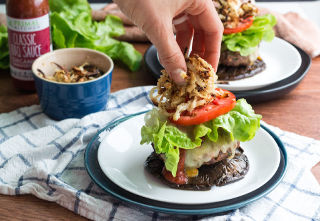 Potentially controversial statement alert: burgers are the most perfect food.
Potentially controversial statement alert: burgers are the most perfect food.
Hear me out.
Burgers are delicious. They are portable. As meat goes, ground beef is relatively affordable. It takes less than 10 minutes to cook a burger on the stovetop or grill. Kids and adults like them equally.
Most of all, they are endlessly adaptable. Burgers are the vanilla ice cream of main dishes: great on their own and also a perfect canvas upon which to build your culinary masterpiece.
The problem is, since burgers are ubiquitous in the fast food world, they sometimes garner an unfair reputation for being unhealthy. Not so! Sure, a drive-thru burger isn’t the world’s healthiest food. Nor is it the worst by a long shot. In any case, there are ways to take a basic burger and build a healthier meal.
It’s time burgers ascend to their rightful place in the food hierarchy—at the top, obviously. First, though, let’s give them a little glow up to make sure they are as nourishing as possible.
5 Steps for a Healthier, Tastier Burger
1. Ditch the Bun
Primal folks know this already, but it still has to be said.
A few short years ago, ancestral diets were labeled as fads. Today, every restaurant from fast food to fine dining offers lettuce wraps like it’s no big deal. What a shift! Iceberg lettuce is the most common bun substitute, but don’t stop there. Try red romaine or Swiss chard. Collard greens are my favorite. Try blanching them to make them softer and less bitter (see below).
Bun lovers can make grain-free buns, of course, but who says you need to eat burgers with your hands, anyway? Cheeseburger salad is the best way to enjoy a burger if you ask me.
How to blanch collard greens:
- Bring about 2 inches of water to a boil in a wide, deep skillet. Prepare a bowl of ice water.
- Trim the thickest part of the stem out of each collard green. Try to leave the leaf mostly intact, but you will probably end up with a 2- to 3-inch slit in the leaf.
- Lower the heat to a simmer. One at a time, submerge a collard green in the water for 1 minute, then transfer it to the ice water.
- Pat the leaves dry with a clean kitchen towel. They are now ready to use.
Burger recipes to try:
2. Boost Your Beef
Mark has been beating the drum about grass-fed beef and why it’s superior to CAFO-sourced meat for as long as MDA has been around. That’s not the only way to upgrade your burger, though.
From a nutritional perspective, the best thing you can do is add organs to your burger. Coarsely chop a few ounces of heart, liver, or kidney in a food processor, then mix it into a pound of ground beef before cooking. You won’t be able to taste it and neither will your kids, wink wink.
Pro tips: Quickly saute the liver or kidney before grinding it for a better texture. Heart can be raw or cooked. Your butcher might even be willing to grind it for you.
Don’t limit yourself to beef, either. Bison is almost exclusively pasture-raised, has slightly more protein and less fat, and is richer in omega-3s compared to beef.1 Lamb makes excellent burgers, too. Bison and lamb are usually more expensive than beef, so try a 50/50 blend to stretch your dollar. Poultry isn’t as nutrient-dense as beef, but for variety, maybe include a turkey or chicken burger on the menu now and then.
3. Elevate Your Condiments
Iffy condiments are usually the biggest strike against restaurant burgers, especially mayo or mystery sauce that are probably made with soybean oil. I happen to know a source for mayo, ketchup, mustard, and other condiments made only with ingredients that the Primal community would approve.
When you’re dining out, be willing to be that person—the one who asks for their burger to be lettuce-wrapped with no condiments and then pulls a bottle of ketchup or barbecue sauce out of their bag when the food arrives.
4. Add Avocado
Besides being a delicious source of mostly monounsaturated fats, avocados deliver prebiotic fiber to support a diverse microbiome.2 They may also help mitigate any postprandial inflammatory response to your meal.3
Yes, I know there will be an extra charge for that avocado. Worth it.
5. Pile on the Toppings
One of my favorite things about burgers is that you can transform them in countless ways by adding different toppings. Balsamic glazed onions, mushrooms, and Swiss cheese? Yes, please. Blue cheese and buffalo sauce? Don’t mind if I do!
Use burger night as an excuse to add a variety of colorful vegetables to your plate. Think outside the classic lettuce-and-tomato box:
- Hatch or poblano chile peppers
- Pickled vegetables—not just cucumber pickles, but also sauerkraut, kimchi, or curtido
- Coleslaw (made with avocado or olive oil mayo, naturally)
- Sprouts or microgreens
- Incorporate fresh herbs with chimichurri sauce, or make a Greek burger with lamb and minty tzatziki.
You can even mix vegetables directly into your ground beef for variety and flavor. Try finely chopped mushrooms or shredded carrots or beets. This is also a great way to use beet or turnip greens if zero-waste is your thing.
Don’t worry, carnivores, I haven’t forgotten you. Double or triple down on your burger by stacking corned beef, pastrami, bacon, eggs, or even pulled pork. I can’t say that this makes your burger healthier per se, but tasty? Absolutely.
The top of this post is a bit tongue-in-cheek, but in all seriousness, I’m struggling to think of another food that checks all the boxes: adaptable, delicious, portable, Primal-friendly, and kid-approved. Tell me why I’m right or wrong in the comments!
References
The post How to Turn a Burger Into the Perfect Food appeared first on Mark's Daily Apple.





